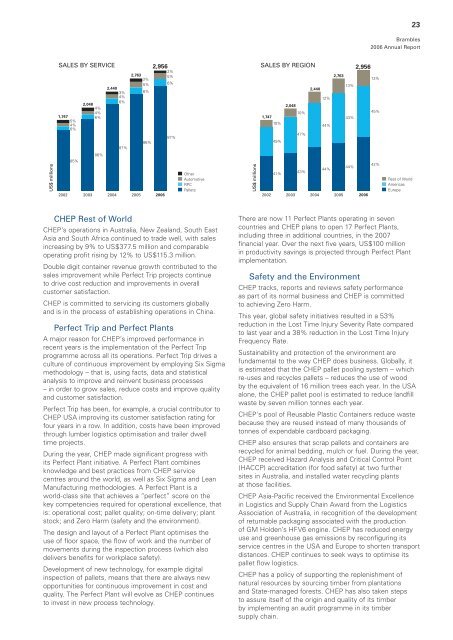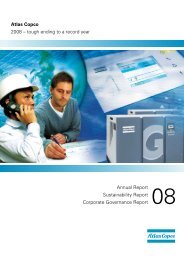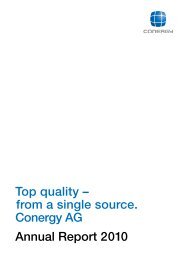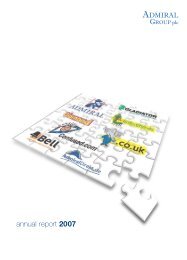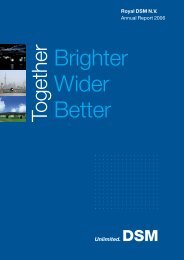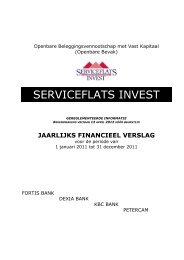Brambles 2006 Annual Report - Alle jaarverslagen
Brambles 2006 Annual Report - Alle jaarverslagen
Brambles 2006 Annual Report - Alle jaarverslagen
Create successful ePaper yourself
Turn your PDF publications into a flip-book with our unique Google optimized e-Paper software.
23<br />
<strong>Brambles</strong><br />
<strong>2006</strong> <strong>Annual</strong> <strong>Report</strong><br />
SALES BY SERVICE<br />
1,747<br />
5%<br />
4%<br />
6%<br />
2,048<br />
4%<br />
4%<br />
6%<br />
2,440<br />
3%<br />
4%<br />
6%<br />
87%<br />
2,763<br />
3%<br />
5%<br />
6%<br />
86%<br />
2,956<br />
2%<br />
5%<br />
6%<br />
87%<br />
1,747<br />
10%<br />
49%<br />
2,048<br />
10%<br />
47%<br />
SALES BY REGION<br />
2,956<br />
2,763<br />
13%<br />
13%<br />
2,440<br />
12%<br />
45%<br />
43%<br />
44%<br />
US$ millions<br />
85%<br />
86%<br />
2002 2003 2004 2005 <strong>2006</strong><br />
Other<br />
Automotive<br />
RPC<br />
Pallets<br />
US$ millions<br />
42%<br />
44%<br />
44%<br />
41%<br />
43%<br />
2002 2003 2004 2005 <strong>2006</strong><br />
Rest of World<br />
Americas<br />
Europe<br />
CHEP Rest of World<br />
CHEP’s operations in Australia, New Zealand, South East<br />
Asia and South Africa continued to trade well, with sales<br />
increasing by 9% to US$377.5 million and comparable<br />
operating profit rising by 12% to US$115.3 million.<br />
Double digit container revenue growth contributed to the<br />
sales improvement while Perfect Trip projects continue<br />
to drive cost reduction and improvements in overall<br />
customer satisfaction.<br />
CHEP is committed to servicing its customers globally<br />
and is in the process of establishing operations in China.<br />
Perfect Trip and Perfect Plants<br />
A major reason for CHEP’s improved performance in<br />
recent years is the implementation of the Perfect Trip<br />
programme across all its operations. Perfect Trip drives a<br />
culture of continuous improvement by employing Six Sigma<br />
methodology – that is, using facts, data and statistical<br />
analysis to improve and reinvent business processes<br />
– in order to grow sales, reduce costs and improve quality<br />
and customer satisfaction.<br />
Perfect Trip has been, for example, a crucial contributor to<br />
CHEP USA improving its customer satisfaction rating for<br />
four years in a row. In addition, costs have been improved<br />
through lumber logistics optimisation and trailer dwell<br />
time projects.<br />
During the year, CHEP made significant progress with<br />
its Perfect Plant initiative. A Perfect Plant combines<br />
knowledge and best practices from CHEP service<br />
centres around the world, as well as Six Sigma and Lean<br />
Manufacturing methodologies. A Perfect Plant is a<br />
world-class site that achieves a “perfect” score on the<br />
key competencies required for operational excellence, that<br />
is: operational cost; pallet quality; on-time delivery; plant<br />
stock; and Zero Harm (safety and the environment).<br />
The design and layout of a Perfect Plant optimises the<br />
use of floor space, the flow of work and the number of<br />
movements during the inspection process (which also<br />
delivers benefits for workplace safety).<br />
Development of new technology, for example digital<br />
inspection of pallets, means that there are always new<br />
opportunities for continuous improvement in cost and<br />
quality. The Perfect Plant will evolve as CHEP continues<br />
to invest in new process technology.<br />
There are now 11 Perfect Plants operating in seven<br />
countries and CHEP plans to open 17 Perfect Plants,<br />
including three in additional countries, in the 2007<br />
financial year. Over the next five years, US$100 million<br />
in productivity savings is projected through Perfect Plant<br />
implementation.<br />
Safety and the Environment<br />
CHEP tracks, reports and reviews safety performance<br />
as part of its normal business and CHEP is committed<br />
to achieving Zero Harm.<br />
This year, global safety initiatives resulted in a 53%<br />
reduction in the Lost Time Injury Severity Rate compared<br />
to last year and a 38% reduction in the Lost Time Injury<br />
Frequency Rate.<br />
Sustainability and protection of the environment are<br />
fundamental to the way CHEP does business. Globally, it<br />
is estimated that the CHEP pallet pooling system – which<br />
re-uses and recycles pallets – reduces the use of wood<br />
by the equivalent of 16 million trees each year. In the USA<br />
alone, the CHEP pallet pool is estimated to reduce landfill<br />
waste by seven million tonnes each year.<br />
CHEP's pool of Reusable Plastic Containers reduce waste<br />
because they are reused instead of many thousands of<br />
tonnes of expendable cardboard packaging.<br />
CHEP also ensures that scrap pallets and containers are<br />
recycled for animal bedding, mulch or fuel. During the year,<br />
CHEP received Hazard Analysis and Critical Control Point<br />
(HACCP) accreditation (for food safety) at two further<br />
sites in Australia, and installed water recycling plants<br />
at those facilities.<br />
CHEP Asia-Pacific received the Environmental Excellence<br />
in Logistics and Supply Chain Award from the Logistics<br />
Association of Australia, in recognition of the development<br />
of returnable packaging associated with the production<br />
of GM Holden’s HFV6 engine. CHEP has reduced energy<br />
use and greenhouse gas emissions by reconfiguring its<br />
service centres in the USA and Europe to shorten transport<br />
distances. CHEP continues to seek ways to optimise its<br />
pallet flow logistics.<br />
CHEP has a policy of supporting the replenishment of<br />
natural resources by sourcing timber from plantations<br />
and State-managed forests. CHEP has also taken steps<br />
to assure itself of the origin and quality of its timber<br />
by implementing an audit programme in its timber<br />
supply chain.


